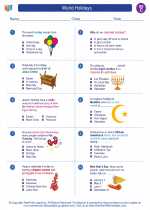Carnival: Exploring a Festive Tradition
Welcome to the fascinating world of carnival! Carnival is a vibrant and joyous celebration that takes place in many parts of the world. It is a time for communities to come together and enjoy music, dance, parades, and various forms of entertainment. Let's dive into the rich history and cultural significance of this exciting tradition.
History of Carnival
Carnival has its roots in ancient Roman and Greek festivals, which were held to honor the gods of fertility and the arrival of spring. Over time, the tradition evolved and spread to different regions, each adding its own unique customs and traditions. In many cultures, carnival is held as a pre-Lenten celebration, marking the period of indulgence before the fasting and abstinence of Lent.
Key Elements of Carnival
There are several key elements that make up the colorful tapestry of carnival celebrations:
- Parades: Elaborate processions featuring floats, costumes, and lively music are a hallmark of carnival. Participants often showcase their creativity through extravagant and artistic displays.
- Costumes: Carnival is known for its vibrant and elaborate costumes, which often reflect cultural themes, historical figures, or mythical characters.
- Music and Dance: From samba in Brazil to calypso in Trinidad and Tobago, music and dance are integral to the carnival experience, creating an atmosphere of infectious energy and rhythm.
- Street Parties and Festivities: Carnival brings communities together for street parties, outdoor concerts, and other festive gatherings where people can revel in the spirit of togetherness and merriment.
Global Variations
While the spirit of carnival is universal, each region puts its own unique spin on the tradition. Here are a few notable examples:
- Rio de Janeiro, Brazil: The Rio Carnival is one of the largest and most famous in the world, featuring spectacular parades, samba competitions, and vibrant street parties.
- Venice, Italy: The Venice Carnival is renowned for its opulent masks and costumes, as well as its elegant masquerade balls set against the backdrop of the city's historic architecture.
- New Orleans, USA: Mardi Gras, the carnival celebration in New Orleans, is a lively affair known for its colorful floats, jazz music, and traditional Mardi Gras beads.
Study Guide
Now that we've explored the world of carnival, it's time to test your knowledge! Use the study guide below to review what you've learned and deepen your understanding of this festive tradition.
1. What are the historical roots of carnival?
The historical roots of carnival can be traced back to ancient Roman and Greek festivals, which celebrated the arrival of spring and honored the gods of fertility.
2. What are some key elements of carnival celebrations?
Key elements of carnival include parades, elaborate costumes, music and dance, and street parties and festivities.
3. Name three regions known for their unique carnival celebrations and describe one distinctive feature of each.
- Rio de Janeiro, Brazil: Known for its spectacular parades and samba competitions.
- Venice, Italy: Renowned for its opulent masks and elegant masquerade balls.
- New Orleans, USA: Lively affair known for colorful floats, jazz music, and traditional Mardi Gras beads.
With this study guide, you're well on your way to becoming a carnival expert! Keep exploring and learning about the diverse traditions that make our world so rich and vibrant.
[Carnival] Related Worksheets and Study Guides:
.◂Social Studies Worksheets and Study Guides Third Grade. World Holidays

 Study Guide
Study Guide
 Study Guide
Study Guide
 Study Guide
Study Guide
 Study Guide
Study Guide
 Study Guide
Study Guide
 Study Guide
Study Guide
 Study Guide
Study Guide
 Study Guide
Study Guide
 Worksheet/Answer key
Worksheet/Answer key
 Worksheet/Answer key
Worksheet/Answer key
 Worksheet/Answer key
Worksheet/Answer key
 Worksheet/Answer key
Worksheet/Answer key
 Worksheet/Answer key
Worksheet/Answer key
